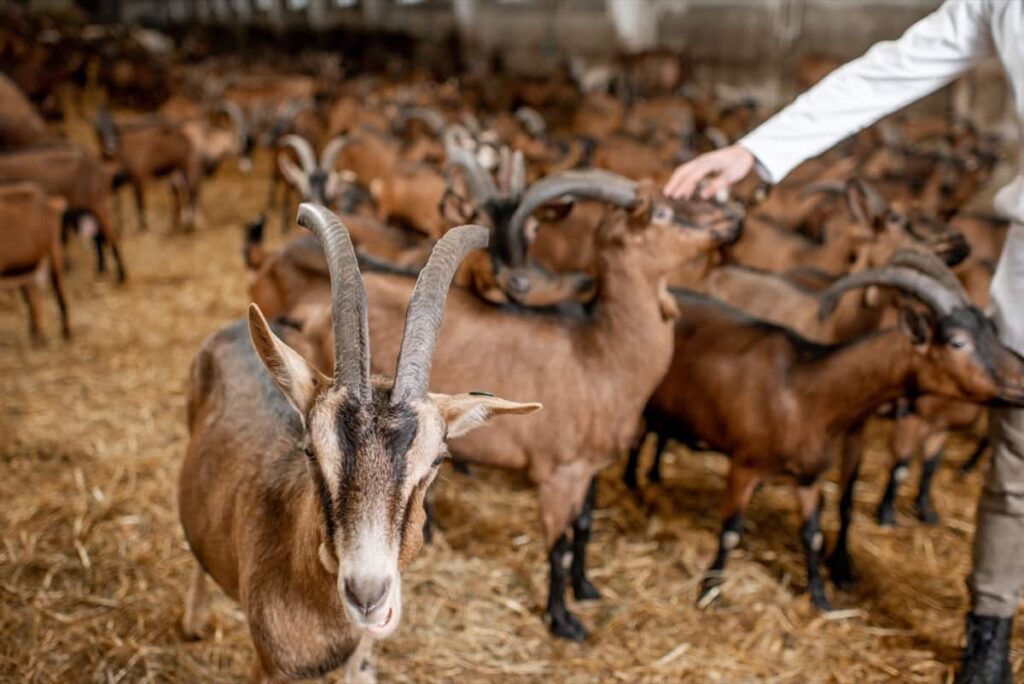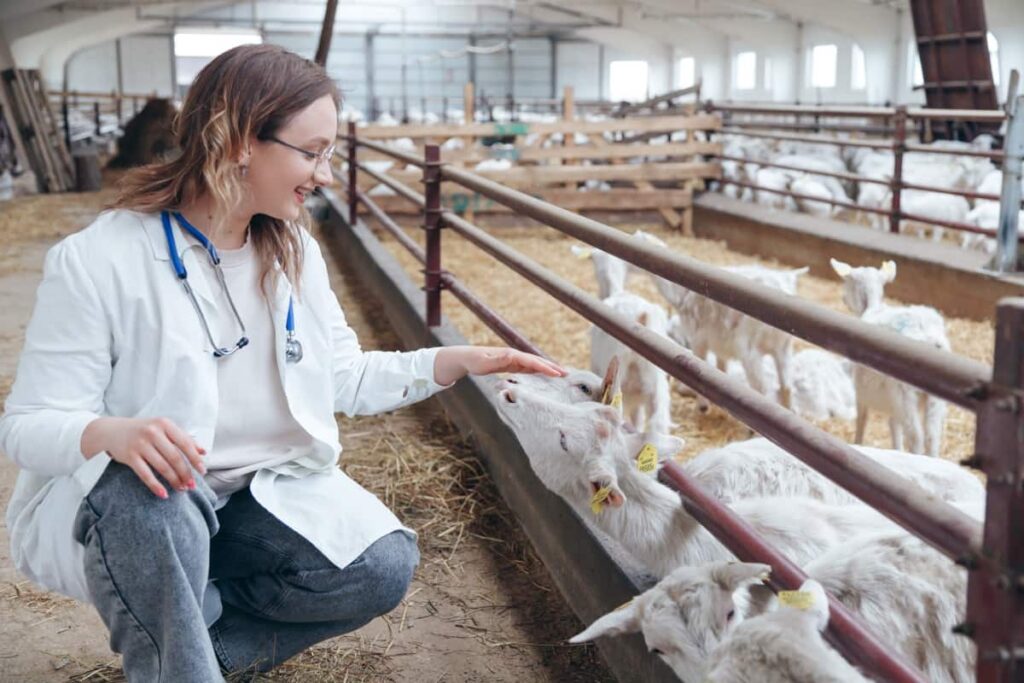Goat farming is the process of raising and breeding goats, a type of domesticated animal often used for its meat, milk, and fiber. Goats require proper housing with enough space to move around and stay comfortable. They also need access to clean water and nutritious feed to maintain their health.

Identifying Sick Goats
- Identifying sick goats is essential for any goat owner or farmer. Early detection of an illness can prevent it from spreading and potentially save the life of your goat.
- In addition to providing adequate care for your goats, it’s also important to know about identifying potential health issues. This includes recognizing signs such as decreased appetite or abnormal behavior which could indicate sickness.
- A sudden behavior change is a common sign that a goat may be sick. If your once-active goat becomes lethargic, refuses to eat or drink, isolates itself from other goats, or displays unusual aggression, it may be a sign that something is wrong.
- Another indicator of ill health in goats is physical symptoms. Check for changes in their coat, such as thinning hair or bald patches. Look at their eyes; if they are cloudy or have discharge around them, it could indicate an infection. Also, check their droppings; diarrhea or constipation can signal digestive problems.
- If you suspect one of your goats may be ill, immediately isolate them from the rest of the herd and contact a veterinarian with experience treating livestock animals.
Goat Terminology
- Buck: A male goat
- Doe: A female goat that has given birth
- Kid: A baby goat
- Herd: A group of goats is known as a herd.
- Caprine: Referring to goats as a group
- Fleece: The wool or hair on a goat’s body
- Horns: Bony growths on a goat’s head, often removed for safety reasons.
Signs of a Sick Goat
- Knowing the signs of a sick goat is essential for a goat owner. By identifying these symptoms early on, you can prevent illnesses from spreading and keep your herd healthy.
- One common sign that your goat may be ill is if they are not eating or drinking as much as usual. Goats are known for their hearty appetites, so this sudden behavior change should raise concerns. Another indication of illness could be weight loss or weakness in your goat.
- Be aware of any changes in their behavior; goats that appear lethargic or have difficulty standing up and walking may also indicate sickness. Additionally, check their eyes and nose regularly for discharge; excessive mucus could signify respiratory issues.
- Another symptom to watch out for is diarrhea or constipation – both suggest digestive problems which need immediate attention. Pay close attention to unusual smells, especially foul-smelling breath or feces – these odors often accompany infections.
In case you missed it: Exploring the Art of Goat Farming in Kashmir Valley

Diagnosing Illnesses in Goats
- One important step in diagnosing illness is regularly checking your goats’ vital signs, such as temperature, pulse, and respiration rate.
- Another crucial aspect of diagnosis is recognizing abnormal behavior or physical changes in your goats. This could include a loss of appetite, lethargy, diarrhea, coughing, or sneezing.
- When seeking veterinary care for a sick goat, having as much information about their condition as possible, including recent feeding habits and medications they’ve received, is helpful.
- Early detection and prompt treatment are key factors in successfully diagnosing illnesses in goats. Regular monitoring and timely veterinary intervention can help ensure the best possible outcome for these beloved animals.
Common Goat Health Issues
- Goats are generally hardy animals, but like any other livestock, they can still be affected by various health issues. Identifying and treating these issues quickly is crucial to maintaining your herd’s health and well-being.
- One common issue that goats face is parasitic infections. These can include internal parasites such as worms or external parasites like lice and mites. Symptoms may include weight loss, diarrhea, hair loss, or anemia. Treatment options change depending on the type of parasite involved.
- Another common issue is respiratory illnesses such as pneumonia. Bacteria or viruses can cause this, and symptoms may include coughing, fever, and difficulty breathing. Prompt treatment with antibiotics is necessary for a full recovery.
- Joint problems such as arthritis or lameness are also fairly common in goats. This could be due to genetics or overexertion from jumping around too much. Working with a veterinarian to develop an appropriate management plan can help alleviate these issues.
Prevention Strategies for Keeping Healthy Goats
- Prevention is always better than cure. You can use several strategies to keep your goats healthy.
- Make sure that your goat’s living space is clean and dry. This means regularly cleaning their stall or pen, removing wet bedding, and providing proper ventilation. This will help prevent the harmful bacteria growth and fungi in their environment.
- Provide a balanced diet for your goats that meets all their nutritional needs. A good diet will keep them healthy and promote good digestion, which helps fight off infections.
- Ensure that your goats have access to fresh water at all times.
- Establish a regular vaccination schedule with the help of a veterinarian based on regional disease threats to protect against common illnesses like tetanus or enterotoxemia.
- Conduct routine check-ups on your goat’s health status so you can find early signs of illness before it becomes serious enough to require emergency intervention.
Health Care Tips for Goats
Caring for goats requires a lot of time, effort, and knowledge. A goat farmer should be able to identify the different terminologies concerning these animals and know how to diagnose illnesses in them. Being aware of the common health issues that can affect goats is also crucial, as well as their signs and symptoms. When a goat gets sick, it’s essential to provide proper treatment promptly. It may involve administering medicine or providing supportive care like extra hydration or nutrition.
In case you missed it: How to Build a Goat House/Shed on Budget: Types of Goat Sheds, Requirements, and Materials

Preventing diseases from affecting your herd is vital by implementing vaccination programs and regular check-ups. Taking good care of your goats ensures their long-term health and productivity. By being knowledgeable about identifying sick goats’ signs early on, you can keep them happy and healthy.
Conclusion
Recognizing the signs of illness in your goats is crucial for maintaining their health. Regularly checking them for changes in behavior or physical symptoms can catch potential problems early on. Treating sick goats plays an integral role in ensuring their overall well-being. As a farmer, it’s vital to understand the early warning signs of sicknesses common among goats so that you may take swift action towards providing them with the timely medical attention they need to recover quickly and stay healthy over time.
- Maximizing Goat Milk Production: Tips for Dairy Goat Farmers
- Goat Farming as a Family Business: Strategies for Success
- Profitable Kenya Goat Breeds for Commercial Dairy and Meat Business
- Unlock the Secrets of Oberhasli Goat: Discover Raising and Management Practices
- Ultimate Guide to Myotonic Goats: Explore Profile to Raising
- Unlock the Secrets of Rove Goat: Discover Management Practices
- Ultimate Guide to Malwa Goat: Explore from Origin to Management Practices
- How AI is Useful in Goat Farming: Precision Practices with AI-Driven Solutions
- Mastering Thuringian Goat: The Ultimate Guide for Beginners